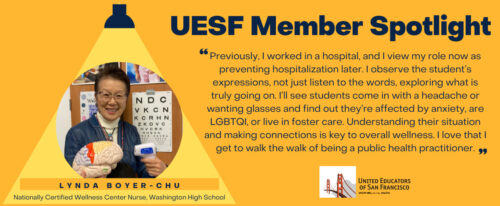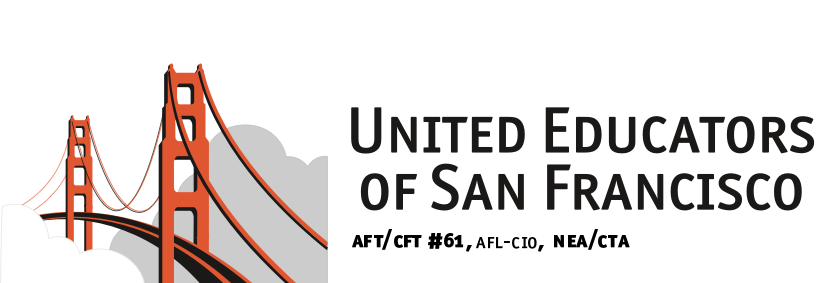
Lynda Boyer-Chu has worked with educators, students, and families as an SFUSD nurse for thirty-two years. For the last seventeen years, Lynda has been the Wellness Center Nurse at George Washington High School. On a day-to-day basis, Lynda actively supports the health and well-being of the 2100 students enrolled at Washington. Lynda considers her “client” to be the entire school, including faculty and staff. When asked what she loves about her role, she said, “Previously, I worked in a hospital, and I view my role now as preventing hospitalization later. I observe the student’s expressions, not just listen to the words, exploring what is truly going on. I’ll see students come in with a headache or wanting glasses and find out they’re affected by anxiety, are LGBTQI, or live in foster care. Understanding their situation and making connections is key to overall wellness. I love that I get to walk the walk of being a public health practitioner.”
In addition to her Bachelors in Nursing, Masters in Public Health, and her state credential, Lynda is also one of only four nurses in the SFUSD with a national credential in school nursing. “To become nationally certified, you have to take a 3-hour exam that checks your knowledge of school health from Pre-K through 12th grade. I’ve been nationally credentialed for the last seven years and would love to see the District value this achievement for myself and others. Teachers are rightfully recognized with financial incentives to become nationally certified. So why not nurses?”
One of the things Lynda loves about her work is being a part of a wellness center. The wellness center concept is a unique structure in San Francisco public high schools bringing together the nurse, wellness coordinator, and community health outreach worker to support their students’ entire range of physical and mental health needs. The team also brings in community partners including CBOs and universities to help support their work. “I would love to see the wellness center concept expanded to all levels in San Francisco and across other Districts. One of the strengths of the wellness concept is empowering students to become educators. And part of my job is to normalize our feelings about sexuality. This year, what we’re exploring is preparing a few of our youth outreach workers to learn more about sexual health. They become knowledgeable, informed, and empowered to explain methods for preventing pregnancy and STI and to refer students with questions to me. I’m looking forward to seeing how this program evolves.”
At the pandemic’s start, Lynda realized we needed to get creative when thinking through how we reach students and families with low attendance. She applied for a grant through the School Nurses of California Foundation to create an “empathy team” focused on connecting with the English Learner population. The team included a parent liaison, administrator, school counselor, school psychologist, nurse, three teachers, and a data expert. Together and with the help of interpreters, they built a program that consistently met with students, their families to identify what they needed to come to school regularly and connect them to services. By the end of the year, over a third of the students had improved attendance, and a third had stabilized. Parents were very appreciative of outreach efforts. When asked what her main takeaways were that would be helpful for others who might want to start a similar program at their school, Lynda said, “My first takeaway would be how incredible it is to see what’s possible with a $1,000 grant. The money was used to mail gifts and resources to the families and provide small honoraria to the members. Small recognitions go a long way. The other thing we noticed was how invaluable a resource like Language Line is, which provided us with Spanish, Vietnamese, and Cantonese interpreters. I’m glad that the SFUSD supports this service and will encourage teachers to use it so they can connect directly with families. We also learned that, in large schools, it’s easy to become siloed into our departments. The empathy team softened those silos and allowed educators to work with and learn from each other. Those are relationships that will continue beyond this program. The program was so effective when we were remote that we are continuing it again this year. Right now, we’re identifying the students and families we’ll work with this year. It’s exciting to watch the program transition from remote to in-person.”
Right before the pandemic, Lynda applied to the Fulbright Specialist Program. After a competitive selection process, she was selected to join the Fulbright Specialist Roster and share her skills, knowledge, and expertise with a community college in Vietnam. When asked about what she is looking forward to in the future, she said, “It’s truly an honor to have been selected. Unfortunately, I was set to go to Vietnam in March of 2019, but COVID had other plans. I know it’ll happen when the time is right, and I’m looking forward to sharing my skills through an international experience in support of Vietnam’s priorities and goals.”



